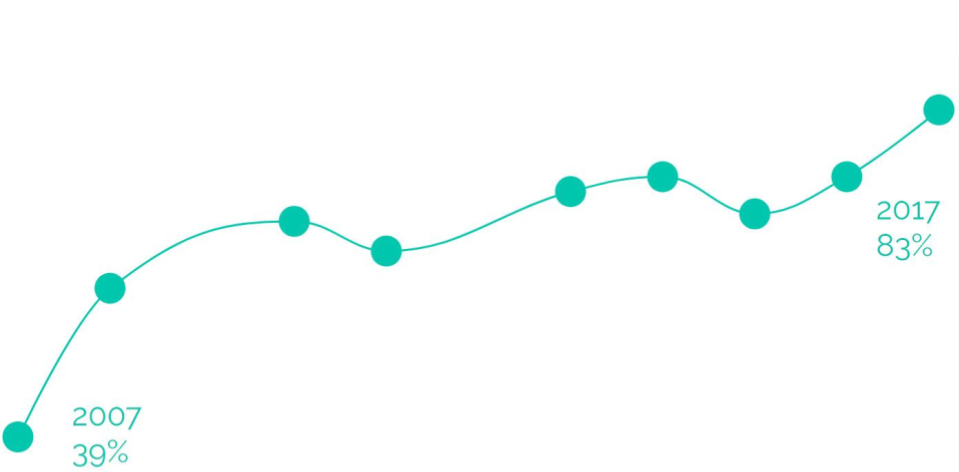3 Reasons why you should run retrospectives
Retrospectives are considered the most important process you can do as a team. Why?

Why would you run retrospectives, and what are the benefits?
The last decade we have seen a significant increase in the usage of retrospectives all over the world. The retrospective is considered the single most important process you can do, because it enables your team to learn, improve and adapt ¹. In this post we will take a closer look at some of the principles behind the method and why it works.

Improve your missions
Picture going on a military mission with your allies. During the mission several of your fellow soliders get wounded and some lives get lost.
What can be done to prevent similar situations from happening in the future?

Military forces have been using a method called "After Action Report" after every mission. Leaders use it as a tool to get maximum benefit from every mission or task. It is a professional discussion of an event that enables the soldiers to discover for themselves what happened, why it happened and how they can sustain strength and improve weaknesses.
“No commander, no matter how skilled, will see as much as the individual soldiers and leaders who actually conduct the training.” ³
The same principle also applies in a work context. The After Action Report have many similarities with retrospectives and share the same principles. The ones who experience the situation are the ones who has most insight regarding what happened and what needs to change.
Retrospectives deal with challenges that affects the employee's performance, motivation and collaboration. Problems are discussed without blaming each other. The retrospective is not just an arena to find problems and discuss them, it should result in actions that provide wanted change.
Three reasons why retrospectives are important
Think about how much time you spend working. We all use tremendous amounts of our lives at work, so why not focus on how we can create strong relations, thrive and find good ways to collaborate with each other?
1. Collaboration, feedback and trust
Expertise and skills are valued in teamwork, but is not nearly as important as creating a collaborative environment. A massive two-year study on successful teams at Google shows that the way that we interact, structure our work and view contributions is more important than who is part of the team ⁴.

One of the most important factors to a successful team is the psychological safety. In other words, one must be able to trust each other, feel safe to contribute and be open to give and receive feedback. If done correctly it will result in a highly motivated performance team.
2. Continuous improvement - Kaizen (改善)
Continuous improvement, often referred to as Kaizen, is at the core of retrospectives. The purpose is to identify opportunities to improve and to reduce wasted time.
Continuous improvement focuses on small changes that will have a large impact long-term. Consistently making small changes for the better is important because it reduces the fear of change and increases the speed to improvement.
Yet, the most important part is that it will make you and your colleagues more satisfied and motivated.
3. "Insanity is doing the same thing over and over again and expecting different results." - Albert Einstein
It is pretty self-explanatory, if you do the same things several times without changing the execution, you cannot expect to get a different result. In a work context this is more normal than you might think. The norm is often doing, doing and doing in an effort to perform and get the wanted results. Many times, you will perform as well, but if you are working the same way and stick to it, chances are that you will stagger. That is why you want to reflect on how you can do it differently to find better solutions which makes you win in the long run.
“We do not learn from experience … we learn from reflecting on experience.” - John Dewey
I want you to think about what the American philosopher, psychologist and educational reformer John Dewey said approximately 100 years ago. The times where you question yourself from different angles and really think about what you have experienced is the times where you can explore and learn. In a hectic work environment it might be hard to find time and situations where you can explore new ways to work better.
Long story short, the key is to have routines or defined reflection points where you can learn and find improvements in order to avoid making the same mistakes over and over again.
By running regular retrospectives, you can figure out what obstacles you are facing, and how you want to work as a group. You will be able to work on the challenges you are facing, learn from mistakes and build a stronger feedback culture in your team.
Follow us on LinkedIn for insights on how you can improve your teams performance.
References:
-
Project Management Institute and Agile Alliance, Agile Practice Guide: Project Management Institute, September 2017.,
Kniberg, Henrik, Scrum and XP from the Trenches, 2nd edition ed.: InfoQ, 2015.
Dingsøyr, T., Mikalsen, M., Solem, A., & Vestues, K. (2018, May). Learning in the Large-An Exploratory Study of Retrospectives in Large-Scale Agile Development. In International Conference on Agile Software Development (pp. 191-198). Springer, Cham. -
Version One, State of the agile report; 2007-2017. https://explore.versionone.com/state-of-agile
-
Army, U. S. (1993). A leader’s guide to after-action reviews. Training Circular, 25-20
-
Google team survey
https://rework.withgoogle.com/blog/five-keys-to-a-successful-google-team/
Picture: https://www.pexels.com/photo/flight-sky-sunset-men-54098/
Picture 2: https://unsplash.com/photos/idY0LkCW0Qs
Picture 3: https://www.pexels.com/photo/group-of-people-holding-hands-forming-teamwork-1083623/

